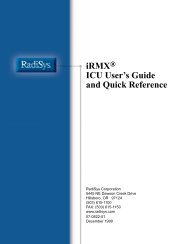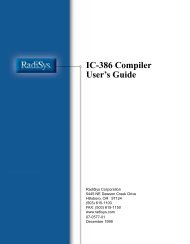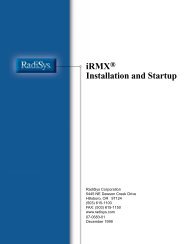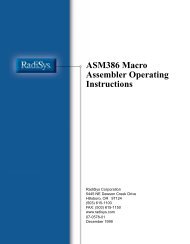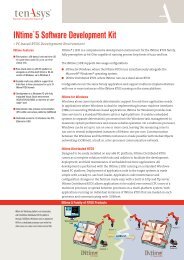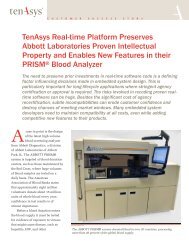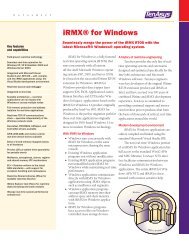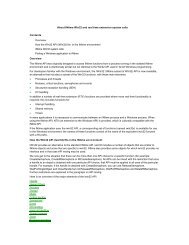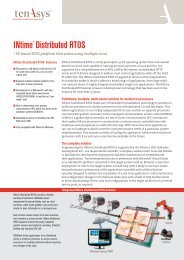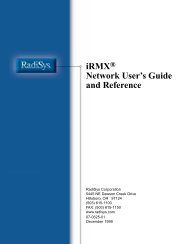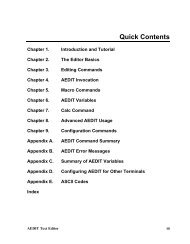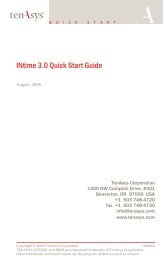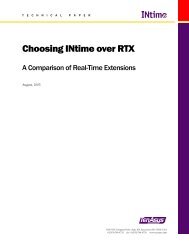INtime® 3.1 Software - tenAsys
INtime® 3.1 Software - tenAsys
INtime® 3.1 Software - tenAsys
Create successful ePaper yourself
Turn your PDF publications into a flip-book with our unique Google optimized e-Paper software.
INtime <strong>3.1</strong> <strong>Software</strong><br />
because its value is 0x10000 or greater. Every iwin32 object includes a handle count.<br />
When the last handle for an object is closed, the object is implicitly deleted.<br />
In Windows, a handle is normally specific to a process and the same handle in<br />
different Windows processes may refer to different objects. Iwin32 implements a<br />
slightly different method, where all handle values are unique. This allows a handle to<br />
be shared between processes, which would be against the Win32 rules.<br />
There is a limit on the number of objects that can exist at any time in the system,<br />
because INtime uses a table to define each object; the size of this table (GDT) is<br />
configurable up to a maximum of about 8000 entries. For information about GDT<br />
configuration, see Running the INtime Configuration Utility on page 68.<br />
Each iwin32 object requires one, two (thread, timer, interrupt), or three (process)<br />
INtime objects. Additional handles for a given iwin32 object do not require additional<br />
INtime objects. Iwin32 uses a fixed size table for all handles, the size of which is<br />
configurable.<br />
iwin32 calls<br />
CloseHandle or RtCloseHandle<br />
iwin32x calls<br />
RtCloseHandle<br />
RtImportHandle<br />
RtSetNode<br />
Named objects<br />
Event, mutex, semaphore and shared memory objects have a Create and an Open<br />
function. CreateXxx checks if the named object of that type already exists and if so,<br />
returns an error and the handle of the found object. If the name exists but belongs to<br />
another object type, the function fails. If the name does not occur yet, the object is<br />
created and the name remembered. If no name is supplied, the name check does not<br />
take place. OpenXxx only does the name check and if that fails, the whole operation<br />
fails.<br />
All object types share one name space, which is not process specific but has system<br />
scope. Iwin32 allows names up to 128 characters.<br />
There are no specific functions for named objects. For details on named objects, see the<br />
functions listed in Events (page 146), Mutexes (page 145), Semaphores (page 146), and<br />
Shared memory (page 147).<br />
Processes<br />
A process is a container for objects and resources; it includes a virtual address space<br />
that is only accessible to the threads in the process. When a process is created, a<br />
primary thread is always created inside it (this is the function named main).<br />
142



